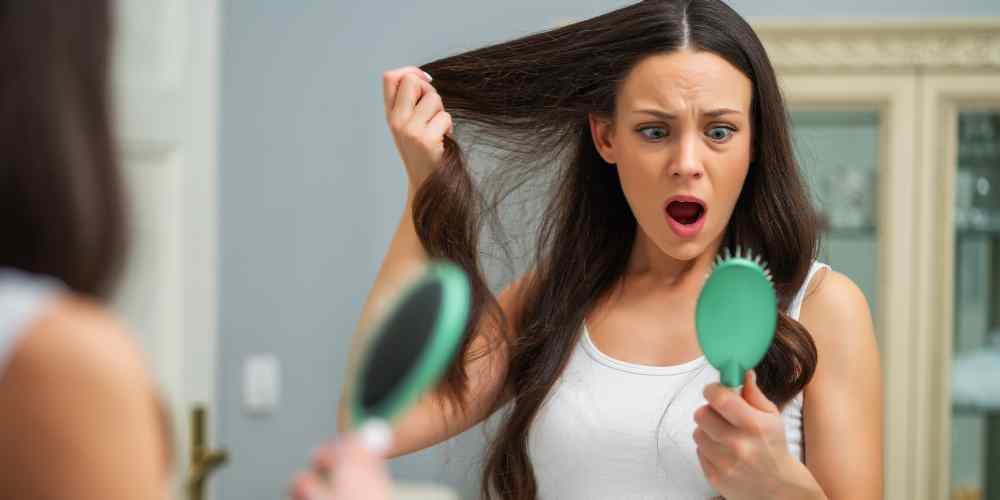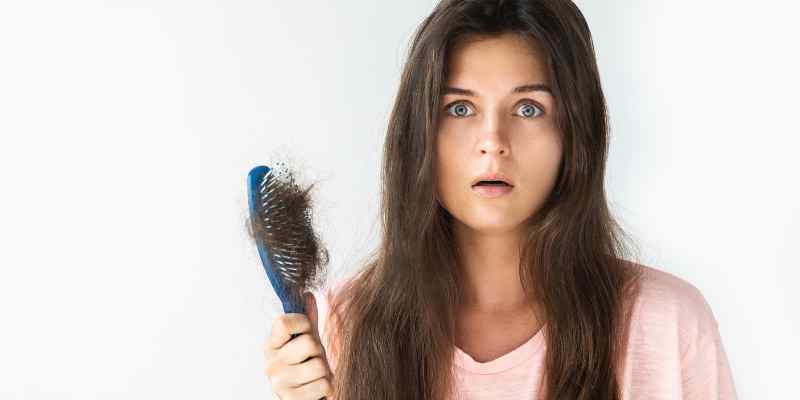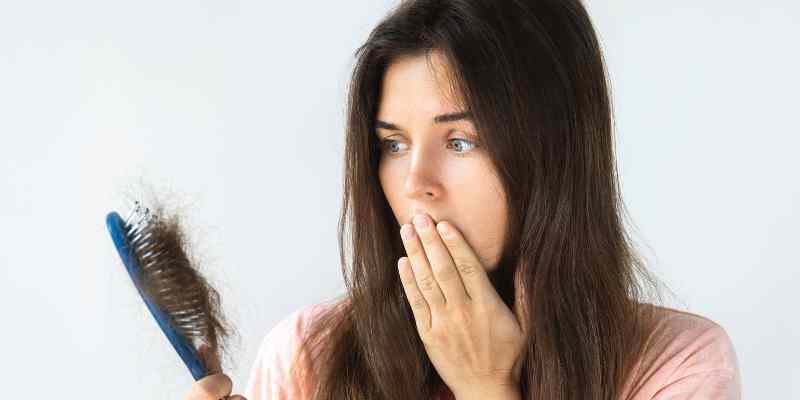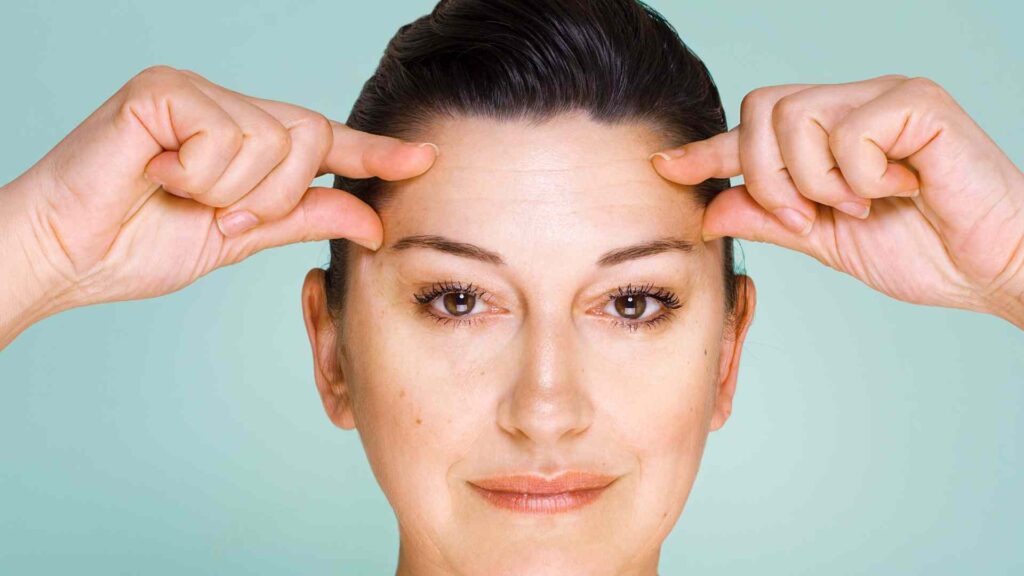Motherhood is a life-changing and phenomenal experience that can transform a woman’s life in countless ways. From the moment a mother holds her child for the first time, she embarks on a journey filled with endless love, joy, and challenges.
But alongside the unique and rewarding experience of a mother come some common struggles. And hair fall after delivery is one of those struggles new mothers experience.
During pregnancy, many women experience a lush, thick head of hair due to hormonal changes in the body. But soon after the delivery, postpartum hair loss is what they encounter.
However, since we focus on the solution more than the problem, in this blog, we will explore the reasons behind hair fall after delivery, its impact on a woman’s mental health, and some of the best tips on how to manage it.
We will also discuss some of the myths around postpartum hair loss and provide scientific explanations to help new mothers understand what is happening to their bodies.
Whether you are experiencing postpartum hair loss or are curious about the topic, this blog will provide valuable insights to help you navigate this challenging but temporary phase of motherhood.
Read on!!

WHAT IS POSTPARTUM HAIR LOSS?
Postpartum hair loss is a normal, frequently upsetting ailment that many new moms experience. Up to 90% of women lose hair after childbirth, with the majority of it happening between three and six months after delivery. While being a transitory condition, postpartum hair loss can be distressing and demoralizing for many women, especially as they are already adjusting to the physical and mental demands of parenting.
The causes of postpartum hair loss are many. Estrogen production surges due to hormonal changes during pregnancy, which can lengthen the anagen (growth) phase of the hair cycle and produce fuller, thicker hair. However, the body suffers a significant drop in estrogen production after delivering, which might result in a shorter anagen period and more shedding. More hair loss may result from the demands of caring for a newborn and the physical and emotional strain of childbirth.
Read more about How to Treat Temple Hair Loss
Each woman experiences postpartum hair loss to a different degree. While some women only experience modest hair loss, others could lose up to 50% of it. Hair loss can happen uniformly across the scalp or it might be more obvious in particular places, such as the hairline or the crown of the head. Postpartum hair loss often peaks three to four months after giving birth and subsides between six to twelve months.
LET’S DISCUSS IN DETAIL ABOUT THE CAUSES OF POSTPARTUM HAIR LOSS
Some of the common factors that impact postpartum hair loss are:
• Hormone: Hormonal changes are the primary cause of postpartum hair loss. During pregnancy, the body produces high levels of estrogen and progesterone, which prolong the anagen or growth phase of the hair cycle. This results in fuller and thicker hair during pregnancy. However, after delivery, when the body experiences a sudden drop in estrogen and progesterone levels, it leads to a shorter anagen phase and increased shedding of hair. This is also why many women experience hair loss after stopping the use of birth control pills, which contain synthetic hormones.
• Stress: The physical and emotional stress of childbirth and caring for a newborn can also contribute to postpartum hair loss. Pregnancy and delivery are physically demanding, and the body needs time to recover fully. Additionally, the emotional stress of caring for a newborn, sleep deprivation, and changes in routine can all contribute to increased stress levels, which can further exacerbate postpartum hair loss.
• Malnutrition: Nutritional deficiencies can also cause postpartum hair loss. During pregnancy, the body’s nutrient requirements increase to support the growth and development of the fetus. However, after delivery, many new mothers may not get enough nutrients, such as iron, biotin, and zinc, which are essential for healthy hair growth. A diet lacking essential nutrients can lead to weakened hair follicles, resulting in increased shedding and thinning of hair.
• Medication: Certain medications, such as antidepressants, blood pressure medications, and thyroid medications, can also contribute to postpartum hair loss.

Read more about What Is Keratin And Why Is It Good For Your Hair?
SOME MYTHS REGARDING POSTPARTUM HAIR LOSS AND THE FACTS
Postpartum hair loss is a natural and temporary condition that affects many new mothers. However, there are several myths and misconceptions surrounding postpartum hair loss that can cause confusion and anxiety for new mothers. In this blog, we will debunk some common myths about postpartum hair loss.
Myth 1: All new mothers will experience postpartum hair loss.
Fact: While it is true that postpartum hair loss is common, not all new mothers will experience it. Some women may not experience any hair loss, while others may experience mild or severe hair loss. The extent of hair loss varies from woman to woman and depends on several factors, such as genetics, nutrition, and stress levels.
Myth 2: Postpartum hair loss is permanent.
Fact: Postpartum hair loss is a temporary condition that typically resolves on its own within six to twelve months. The hair follicles enter a resting phase after shedding, and new hair will eventually grow back. However, it is essential to maintain a healthy and balanced diet and manage stress levels to support healthy hair growth.
Myth 3: Cutting your hair will prevent postpartum hair loss.
Fact: Cutting your hair will not prevent postpartum hair loss. The length of your hair does not affect the hair follicles’ growth or shedding cycle. However, keeping your hair short may make the hair loss less noticeable.
Myth 4: Shampooing too often causes postpartum hair loss.
Fact: Shampooing too often does not cause postpartum hair loss. In fact, it is essential to maintain a clean scalp and hair to prevent clogged hair follicles and bacterial infections that can lead to hair loss. However, using harsh shampoos and conditioners or applying too much heat during styling can cause damage to the hair, leading to hair loss.
Myth 5: Postpartum hair loss is a sign of a serious health problem.
Fact: Postpartum hair loss is a natural and temporary condition that is not usually a sign of a serious health problem. However, if you are experiencing excessive hair loss or other symptoms, such as fatigue or weight loss, it is essential to speak with your healthcare provider to rule out any underlying health issues.

Read more about How to Regrow Thicker Hair Naturally?
HOW TO REDUCE POSTPARTUM HAIR FALL WITH HOME REMEDIES
Amidst all the myths, and stress over postpartum hair loss the good news is that there are several home remedies that can help reduce postpartum hair loss. In this blog, we will discuss some of the most effective remedies that you can try at home.
MASSAGE YOUR SCALP
One of the best ways to reduce postpartum hair loss is to massage your scalp regularly. Massaging your scalp can help stimulate blood flow to your hair follicles, which can promote hair growth. You can use your fingers or a scalp massager to gently massage your scalp for a few minutes each day.
USE NATURAL OILS
Natural oils like coconut oil, olive oil, and castor oil can help reduce postpartum hair loss. These oils are rich in nutrients and can help nourish your hair and scalp. You can apply these oils to your hair and scalp, leave them on for a few hours, and then wash your hair as usual. You can do this once a week for the best results.
EAT A HEALTHY DIET
Eating a healthy and balanced diet is essential for maintaining healthy hair. Make sure you are consuming enough protein, which is essential for hair growth. You should also eat plenty of fruits and vegetables, which are rich in vitamins and minerals that are important for hair health.
TAKE SUPPLEMENTS
Taking supplements like biotin, vitamin D, and omega-3 fatty acids can help reduce postpartum hair loss. Biotin is a B vitamin that is essential for healthy hair, while vitamin D can help promote hair growth. Omega-3 fatty acids are important for maintaining healthy skin and hair.
Know more about What Is Finasteride? The Use of Finasteride for Hair Loss
AVOID HARSH HAIR TREATMENTS
Avoiding harsh hair treatments like coloring, perming, and straightening can help reduce postpartum hair loss. These treatments can damage your hair and make it more prone to breakage and thinning. If you do need to color or style your hair, opt for gentle and natural products.
GET ENOUGH SLEEP
Getting enough sleep is important for your overall health, and it can also help reduce postpartum hair loss. When you are sleep-deprived, your body produces more stress hormones, which can contribute to hair loss. Aim for at least 7-8 hours of sleep each night.
SUPPLEMENTS THAT CAN AID IN REDUCING POSTPARTUM HAIR LOSS AND REVERSE THE CONDITION
Though postpartum hair loss usually resolves on its own, not every woman can keep calm. And they seek better help to deal with the situation.
Fortunately, there are several supplements that can help reduce postpartum hair loss. In this blog, we will discuss some of the most effective supplements that you can take to support healthy hair growth.
BIOTIN
Biotin is a B vitamin that is essential for healthy hair, skin, and nails. It plays a key role in the production of keratin, which is the protein that makes up your hair. Taking a biotin supplement can help strengthen your hair and reduce postpartum hair loss. The recommended dose is typically 2.5 mg to 5 mg per day.
IRON
Iron is an important mineral that is essential for healthy blood flow and oxygen transport in your body. It is also necessary for healthy hair growth. Iron deficiency is a common cause of hair loss, so taking an iron supplement can help prevent postpartum hair loss. The recommended dose is typically 15 mg to 30 mg per day.
Read more about How Much Does Keratin Treatment Cost in Hyderabad?
VITAMIN D
Vitamin D is a key nutrient that plays a vital role in many aspects of your health, including hair growth. It helps regulate the growth and differentiation of hair follicles, and a deficiency in vitamin D has been linked to hair loss. Taking a vitamin D supplement can help reduce postpartum hair loss. The recommended dose is typically 600 IU to 1,000 IU per day.
OMEGA-3 FATTY ACIDS
Omega-3 fatty acids are essential fats that are important for your overall health. They help reduce inflammation in your body, which can contribute to hair loss. Taking an omega-3 supplement can help promote healthy hair growth and reduce postpartum hair loss. The recommended dose is typically 250 mg to 500 mg per day.
COLLAGEN
Collagen is a protein that is essential for healthy skin, hair, and nails. It helps strengthen your hair and prevent breakage. Taking a collagen supplement can help support healthy hair growth and reduce postpartum hair loss. The recommended dose is typically 2.5 g to 5 g per day.
Note: Supplements can be beneficial, but they should not be used as a substitute for a healthy diet. Eating a balanced diet that is rich in nutrients is essential for healthy hair growth.
HOW TO REVERSE POSTPARTUM HAIR LOSS WITH COSMETIC TREATMENTS
While there are several home remedies and supplements that can help reduce postpartum hair loss, some women may opt for cosmetic treatments to help reverse the effects of hair loss. In this blog, we will discuss some of the most effective cosmetic treatments for postpartum hair loss.
• Platelet-Rich Plasma (PRP) Therapy: PRP therapy involves taking a sample of your blood and processing it to extract the platelets, which are then injected into your scalp. Platelets contain growth factors that can help stimulate hair growth and improve hair density. PRP therapy can be an effective treatment for postpartum hair loss, but it may require multiple sessions to see significant results.
• Low-level laser therapy (LLLT): LLLT involves using low-level laser light to stimulate hair growth. It works by increasing blood flow to your hair follicles and promoting the production of adenosine triphosphate (ATP), which is essential for healthy hair growth. LLLT can be done at home using a laser cap or in a clinic setting.
Read more about How to Grow Hair Faster?
• Hair Transplant Surgery: Hair transplant surgery involves taking hair follicles from a donor area (usually the back of your head) and transplanting them to areas of your scalp that are experiencing hair loss. This is a more invasive procedure and may require a longer recovery time, but it can provide a permanent solution to postpartum hair loss.
• Scalp Micropigmentation: Scalp micropigmentation is a cosmetic treatment that is all about drawing tiny dots onto your scalp to mimic the appearance of hair follicles. It can help create the illusion of thicker hair and is a good choice for women with diffuse hair loss.
• Topical Medications: Topical medications like minoxidil and finasteride can help promote hair growth and reduce hair loss. Minoxidil is a topical solution that is applied to your scalp, while finasteride is an oral medication. These medications can be effective for postpartum hair loss, but they may have side effects and require long-term use.
HOW TO DEAL WITH POSTPARTUM HAIR FALL WITH PROPER NUTRITION
While postpartum hair loss is a natural process that many women go through, it can be distressing and affect self-esteem. However, there are foods that can help to reduce postpartum hair loss by providing the necessary nutrients for healthy hair growth. Here are some of the best foods to incorporate into your diet:
• Eggs: Eggs are a great source of protein and biotin, which are essential for healthy hair growth. Biotin is a B vitamin that is important for maintaining healthy hair, skin, and nails.
• Spinach: Spinach is packed with iron, which is crucial for healthy hair growth. Iron helps to carry oxygen to the hair follicles, promoting healthy growth.
• Sweet Potatoes: Sweet potatoes are an excellent source of beta-carotene, a nutrient that is converted into vitamin A in the body. Vitamin A helps to produce sebum, a natural oil that moisturizes the scalp and keeps hair healthy.
• Salmon: Salmon is rich in omega-3 fatty acids, which are essential for healthy hair growth. Omega-3s are anti-inflammatory and can help to prevent hair loss.
• Greek Yogurt: Greek yogurt is an excellent source of protein, which is essential for healthy hair growth. It also contains vitamin B5, which helps to promote healthy hair and prevent hair loss.
• Nuts And Seeds: Nuts and seeds are a great source of vitamin E, which is important for healthy hair growth. Vitamin E is an antioxidant that helps to protect hair follicles from damage.
• Avocado: Avocado is a great source of healthy fats, which can help to keep the scalp and hair moisturized. It is also rich in vitamin E, which as mentioned before, helps to promote healthy hair growth.
WHEN TO SEE A DOCTOR WHILE SUFFERING FROM POSTPARTUM HAIR FALL?
Though in many cases postpartum hair fall reverses on its own, sometimes new mothers might need medical attention. Here are the situations when its mandatory to see a doctor.
• Excessive Hair Loss: While it is normal to lose some hair after giving birth, if you are experiencing an excessive amount of hair loss, it may be a sign of a more serious problem. If you are shedding hair in clumps or noticing thinning spots, it may be time to see a doctor.
• Changes In The Scalp: If you notice any changes in your scalp, such as redness, scaling, or itching, it may be a sign of a scalp condition, such as seborrheic dermatitis or psoriasis. These conditions can exacerbate hair loss and require medical treatment.
• Other Symptoms: If you are experiencing other symptoms along with hair loss, such as fatigue, weight gain, or irregular periods, it may be a sign of a hormonal imbalance or other underlying health condition. In this case, it is important to seek medical attention to rule out any serious health problems.
• Hair Loss Continuing Beyond One Year: While postpartum hair loss is most common in the first few months after giving birth, if you are still experiencing significant hair loss beyond a year after delivery, it may be a sign of an underlying medical condition and you should seek medical attention.
If you are experiencing any of these signs, it is important to see a doctor. A healthcare professional can help determine the cause of your hair loss and recommend appropriate treatments, such as medications or supplements to support healthy hair growth. Additionally, they can rule out any underlying medical conditions and provide peace of mind.
SOME FREQUENTLY ASKED QUESTIONS ABOUT HAIR LOSS
Can I Take Supplements After Delivery To Stop Hair Loss?
It is possible to take supplements after delivery to help prevent or reduce postpartum hair loss. However, it is important to speak with your healthcare provider before starting any new supplements, as some may not be safe for you or your baby if you are breastfeeding. Your healthcare provider can help you determine which supplements are safe and appropriate for you based on your individual health and medical history.
What Supplements Are Best To Reduce Hair Fall After Delivery?
Some supplements that may be helpful in preventing or reducing postpartum hair loss are biotin, iron, Vitamin D, and omega-3 fatty acids. Alongside taking supplements it’s also necessary to maintain a healthy diet and lifestyle to support healthy hair growth. Eating a balanced diet rich in fruits, vegetables, lean proteins, and whole grains can provide the necessary nutrients for healthy hair growth. Getting enough rest, reducing stress, and staying hydrated can also help to support healthy hair.
When Does Postpartum Hair Fall Occur After Delivery?
Postpartum hair loss is a common occurrence for many women after giving birth. It typically occurs 2-4 months after delivery and can last for several months. During pregnancy, many women experience thicker and fuller hair due to hormonal changes. However, after delivery, hormones return to their pre-pregnancy levels, which can cause hair to shed.
CONCLUSION
Postpartum hair loss is a common occurrence that affects many new mothers. It usually begins 2-4 months after delivery and can last for several months. While it can be alarming to see excessive shedding or thinning hair, it is important to know that postpartum hair loss is normal and usually resolves on its own over time.
There are some things you can do to help minimize postpartum hair loss, such as being gentle when washing and brushing your hair, avoiding heat styling tools, maintaining a healthy diet, and staying hydrated. Additionally, supplements such as biotin, iron, vitamin D, omega-3 fatty acids, and prenatal vitamins may help support healthy hair growth.
If you are experiencing excessive hair loss, changes in your scalp, or other symptoms, it is important to see a doctor. However, for most women, postpartum hair loss is nothing to worry about and with time, it will become normal. Remember to be patient with your body and take care of yourself during this time of transition.
